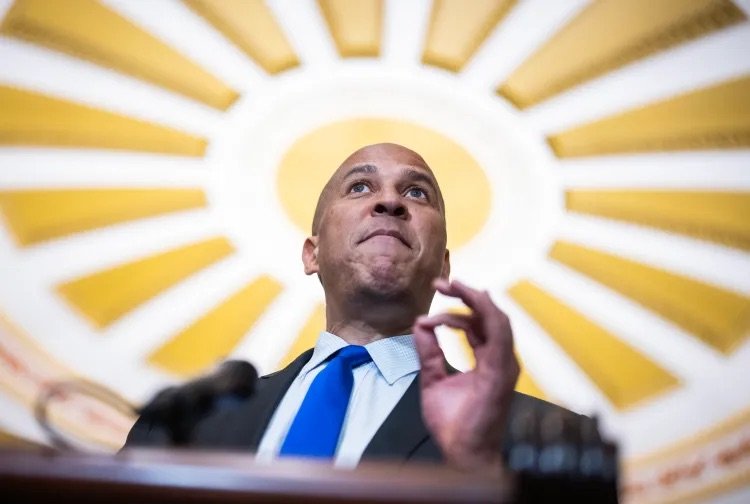“Madam President, I yield the floor.”
And with that, I burst into tears. I may not be the only one who did. But I know that I was the only one crossing the intersection of Buchanan and Northpoint who did.
I was not aware that Senator Booker’s filibuster was happening at all until well into its twenty-second hour. But for a week now, I’ve been thinking about the phrase (often misattributed to Thomas Jefferson):
“When injustice becomes law, resistance becomes a duty.”
Photo: Tom Williams/CQ-Roll Call, Inc. Via Getty Images
In this moment, and over the past seventy-some days, we have been witnessing gross injustice being treated as if it were law — even when it is in flagrant violation of it.
To Booker’s point: this is not about right or left, but about right and wrong. Nothing justifies the harm that is being inflicted on so many vulnerable and truly innocent people.
I have been feeling caught between two fires lately. I cannot accept any of this. It is sick-making and heartbreaking. But I doubt that my response equals resistance. I stew in powerlessness. I am unhappy with what I perceive to be my available choices: “Yes, I can contact my representatives. Yes, I can be a good neighbor, a thoughtful and caring member of my community. Yes, I can make every effort I can not to inflict more harm. Yes, but….”
And then I laugh. Because I’m the physician who can’t heal myself.
Because when a client says to me “yes, but…” my job is to steer them back to the truth: our external circumstances and available choices, the labels others put on us, don’t determine what we can or should do.
What is possible — for each of us — has everything to do with what is in us: our gifts and strengths and convictions, as well as our unique problem-solving. Because the actions we take, the solutions we create, have everything to do with how we see the problem in the first place.
Senator Booker is a perfect example. He stood for over 25 hours straight, speaking out on behalf of all citizens of this country (whether or not they agree with his politics), because he was exactly the one to do so.
He had a unique combination of things to bring to the wrongness of this moment: the physical and moral strength, the will, the compassion, the sense of urgency; the vision for a better world, and the fearlessness to call his peers to task for their lack of resistance.
And as a problem-solver, he recognized that he had the platform, visibility, and sphere of influence that could be leveraged to carry his message far beyond the room in which he stood. (And, by his own admission, he loves to talk. I should have started with that.)
He took what he had and he made the most of it.
If you can’t see what you have to bring to this moment, I want to talk to you. Twenty minutes, on me. You can book here.
I want nothing more than for you to see what I see: that you have something important to offer. And that once you see it for yourself, you can put it to work.
Meanwhile, take good care. We need you.

